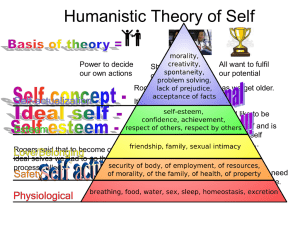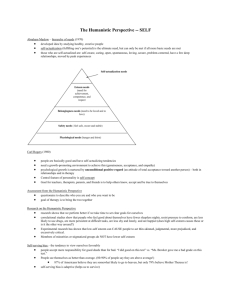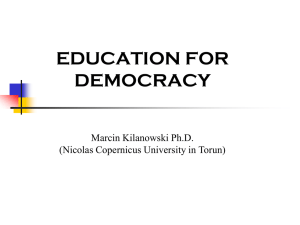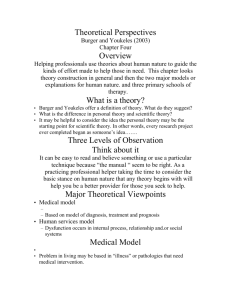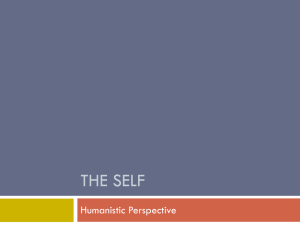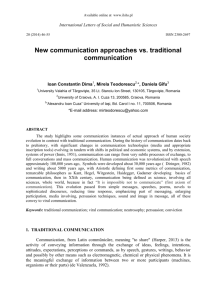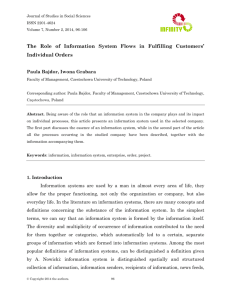Archivo - Humanistic Management Network
advertisement
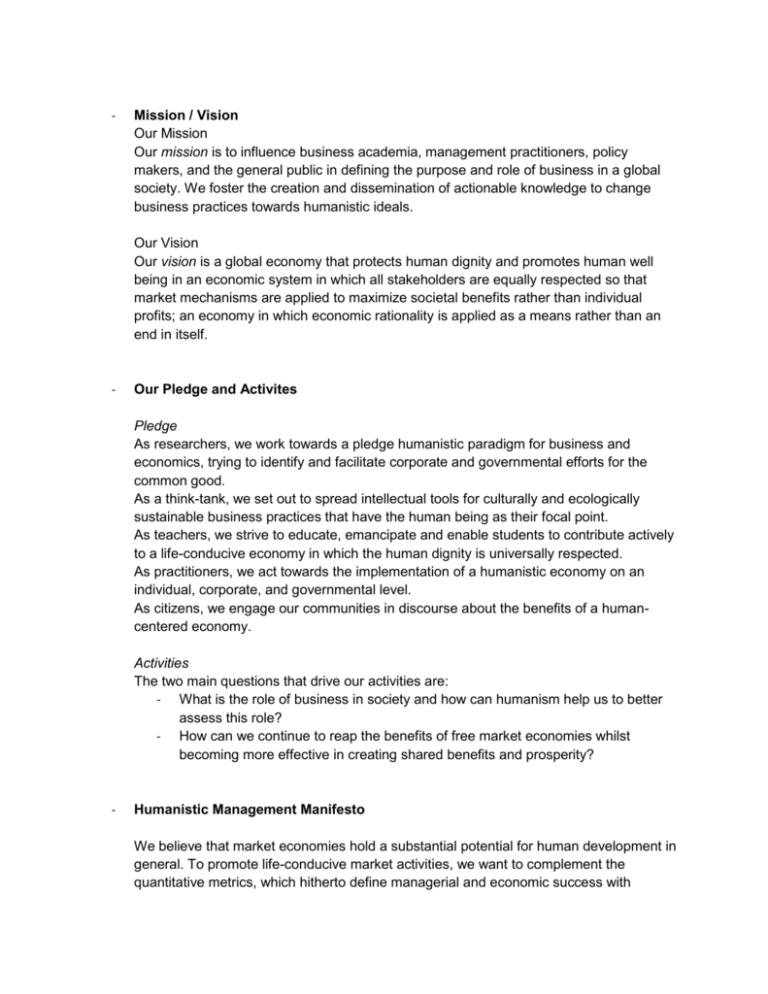
- Mission / Vision Our Mission Our mission is to influence business academia, management practitioners, policy makers, and the general public in defining the purpose and role of business in a global society. We foster the creation and dissemination of actionable knowledge to change business practices towards humanistic ideals. Our Vision Our vision is a global economy that protects human dignity and promotes human well being in an economic system in which all stakeholders are equally respected so that market mechanisms are applied to maximize societal benefits rather than individual profits; an economy in which economic rationality is applied as a means rather than an end in itself. - Our Pledge and Activites Pledge As researchers, we work towards a pledge humanistic paradigm for business and economics, trying to identify and facilitate corporate and governmental efforts for the common good. As a think-tank, we set out to spread intellectual tools for culturally and ecologically sustainable business practices that have the human being as their focal point. As teachers, we strive to educate, emancipate and enable students to contribute actively to a life-conducive economy in which the human dignity is universally respected. As practitioners, we act towards the implementation of a humanistic economy on an individual, corporate, and governmental level. As citizens, we engage our communities in discourse about the benefits of a humancentered economy. Activities The two main questions that drive our activities are: - What is the role of business in society and how can humanism help us to better assess this role? - How can we continue to reap the benefits of free market economies whilst becoming more effective in creating shared benefits and prosperity? - Humanistic Management Manifesto We believe that market economies hold a substantial potential for human development in general. To promote life-conducive market activities, we want to complement the quantitative metrics, which hitherto define managerial and economic success with qualitative evaluation criteria that focus on the human dignity and well-being of every woman and every man. In business as well as in society, respect for human dignity demands respect for human freedom. Collective decision-making, in corporations just as in governments, should hence be based on free and equal deliberation, participation or representation of all affected parties. Concerns of legitimacy must, in economics like in politics, precede questions of expediency. The Humanistic Management Network defends human dignity in face of its vulnerability. The dignity of the human being lies in its capacity to define autonomously the purpose of its existence. Since human autonomy realizes itself through social cooperation, economic relations and business activities can either foster or obstruct human life and well-being. Against the widespread objectification of human subjects into human resources, against the common instrumentalization of human beings into human capital and a mere means for profit, we uphold humanity as the ultimate end and principle of all economic activity. - About humanistic management: Our point of departure is a clear acknowledgement of the tremendous progress that variations of market economies have brought about in many societies. The wealth and prosperity enjoyed in the rich parts of the world today are unprecedented and give us reason to embrace those factors that have led to the emancipation from existential hardship and a substantial increase in personal and collective freedoms in those societies. Simultaneously, however, the success story of market economies has produced negative side effects that have become to grave to be ignored by simply claiming that the pro's outweigh the con's. This holds true on a global, systemic level as well as when examining business organizations and also people as individuals. Consequently the Humanistic Management Network advocates a paradigm shift away from economistic views on market activities towards a humanistic approach. To move from criticism of the status quo towards a fruitful discourse on alternatives we have developed a three stepped approach offering guidance and an anchor for reflection on managerial decisions as well as decision making processes. We understand humanistic management on the basis of three interrelated dimensions. These are: - Firstly that we as humans deserve and rightfully expect our dignity to be respected under all circumstance. - Secondly, that ethical consideration must form part and parcel of business decisions and - Thirdly that actively embracing corporate responsibilities is contingent upon initiating and maintaining an ongoing dialogue with stakeholders. In summary, humanistic management is the pursuit of strategies and practices aimed at the creation of sustainable human welfare. In combination, these three dimensions promote human well being through economic activities that are life-conducive and add value to society at large. Submitting business decisions to these three guiding principles is what we call humanistic management. Chapters Example - Chapter name: Humanistic Management Network: Colombia Chapter - Contact name: Carlos Largacha - Martinez Ph.D. Profesor Titular - Contact address: University EAN, El Nogal Carrera 11 No. 78-47 Bogotá Colombia - Email: clargacha@ean.edu.co - Background information: El capítulo Colombia de la Red Internacional de Gerencia Humanista fue creado con el propósito de difundir las ideas de prácticas gerenciales centradas en el ser humano a nivel de la academia, las organizaciones, y a futuro, de políticas públicas. Existe un interés de conocer casos reales Colombianos que reafirmen que sí es posible el generar negocios sostenibles que ponen al ser humano como su fin. Compartimos los tres pilares fundaciones que establece la Red desde su fundación, incorporándolos a la realidad cultural Colombiana, así como a los principios del equipo del capítulo Colombia. - Chapter activites: We promote entrepreneurship at University EAN, develop the ‘Youth Researchers Group’ about Humanistic Management, and continue to advocate through publishing our works in Spanish and English and participating in relevant conferences. We will also work on improving the effectiveness of the HumaNet system, encourage more participations from companies, develop in house consultancy to Colombian companies and develop international interdisciplinary networks with Society for Organizational Learning, MIX, Royal Society of Arts, Self Management Institute and BCorp. - Chapter news: Join us The Humanistic Management Network welcomes your participations and encourages scholars, practitioners and policy makers to join. If you have a particular interest in our activities and region, please contact a chapter leader in your area.

